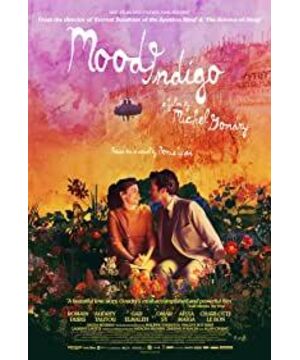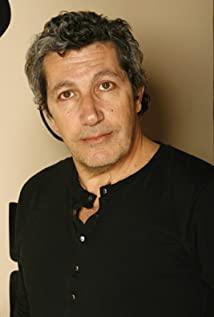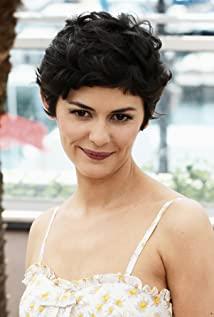The film is directed by Michelle Gondry ("The Lights", "Scientific Sleep", "Tokyo!") and Audrey Tautou ("Amelie", "The Long Engagement", "Daphne") Strange Code, Krapis French Youth Trilogy), Romain Duris (The Rhythm My Heart Forgot, French Youth Trilogy) and is widely known to domestic audiences for his performance in "Untouchable" Starring Black Omar Sai, photographer Christophe Beaucarne. From a commercial point of view, the subject matter of this film is very interesting, and the cast is also attractive (some people will be satisfied with the goddess Tatu alone = = If you are not satisfied, please watch the 36th minute of the film), but the actual perception is average, and the emotions are wanton It is pervasive and uncontrolled, and the audience easily loses attention and falls into the tiredness of the dazzling fantasy world. It can be seen that it is better for commercial films to think of the audience as stupid. I remember that Feng Xiaogang regarded some cultural critics as "big". "Tail wolf" and "cultural Nazis", isn't the subtext "I lied to a fool for money, you can handle it, you guys".
Without further ado, back to the topic. I liked the film "Life in a Bubble" very much, and was deeply moved by its delicate fantasy, despair and many symbols of the characters. The film is built on a fantasy world background mixed with steampunk, industrial utopia, and surrealism. It takes the hero and heroine's relationship from meeting to love and marriage as a narrative clue. The hero, Colin, is fashionable, rich, and loves food, but he did not lose it. Childish, the heroine Chloe is beautiful, pure and understanding, but on her honeymoon trip a water lily hits Chloe's lungs and makes her sick. There are also a group of interesting friends around Colin, the chef Nicola, who is eager to help, with strange and romantic words, the assistant pet mouse who can reflect Colin's situation, and Nicole, who is obsessed with dog and behaves like a pet. Pull girlfriend Isis, madly in love with left-wing intellectual icon Jean Sal-keep (fictional) but working in a strange factory. The financial pressure of seeing a doctor for Chloe overwhelmed the wealthy Colin, but Chloe's life was irreversibly heading towards death.
The film is full of devices and toys described in the original novel, and the first ten minutes of the film are basically used to display these weird and elusive objects, including reptile-like doorbells that need to be killed to silence, light that can be played , along with different melody, cocktail pianos with different flavors, wedding cars with transparent shells, and even the weddings of spaceships, go-karts and gun-wielding godfathers are not recorded here. But the characters in the movie are not carefree because of these wonderful tools. They have the same pressures as the real world, such as economy, marriage, birth, old age, sickness and death. Stripping away the fantasy elements in this film, the movie tells a very pessimistic love story, love at first sight. The lover is separated from Yin and Yang because of illness. The water lily disease in the film is obviously a metaphor for "lung cancer" ("cough", "spread", "surgery"), and it is not shy about the economic crisis caused by the treatment. to an irreversible situation.
Using the disease as a dividing line, the film shifts from bright colors, delicate composition, high-key photography to dim light, chaotic composition and low-key photography, and even fades to black and white at the end, which is a bold idea for the mood of the film I especially I agree, and the black and white of the film is not a simple fading, but a consideration in photography, color grading and lighting. The emotional transition from the romantic fantasy in the first half to the pain, cruelty, and forced laughter in the second half is heart-wrenching. But the cut-off point of illness is just the emotional turning point of the film (in Hollywood parlance, it is the "midpoint" of the story), the film's interpretation of the director's pessimistic philosophical views is consistent, and if we look closely, we will find that the whole film has never The intention is to tell a true utopia, whether it's the hero and heroine dating at the exit of a tunnel feeding unintelligible grey pigeons (which is actually a location worth pondering), or a picnic lunch across the table in different weather (easy to make. Reminds me of the old poem "sunrise in the east and rain in the west"), not to mention the dark humor of the horrific ice skating rink death, where the winner of the game was hit by the glass and killed dozens of people for the prize, which was her The last words of the deceased were translated into 27 languages. The monuments of the deceased immediately appeared in the skating rink for people to mourn while cleaning up the bodies, and the protagonists had forgotten the word in a blink of an eye. Water lily disease is not so much the beginning of the protagonist's tragedy, but water lily disease brings the once wealthy Colin to the cruel side of this romantic world - full of boring, hypocritical and aimless people, standing in factories working hard for a little salary. Even the workers who died (the death in the second half was too bloody), the civil servants usually served the citizens but rushed into the citizens' homes to murder at critical moments, shot and killed in the square, and stole the life-saving money of friends for their hobbies, because of loneliness And on the wife of a friend, Colin killed at will because of his impatience. In the second half of the film, Colin's terrifying experience of failing to find a job in order to make a living reminds the audience that this is a cold world, especially when you have no money!
It is commendable that, while telling a love story plagued by water lily disease, the film also interspersed with the tragic love of Chick and Alice. Alice killed the philosopher and the bookstore owner in a fit of rage, and both of them died in Huangquan. Before they died, they still could not understand each other and completely refused ("half sea and half fire" in the scene), Cheek and Alice's relationship Love is the opposite of Colin Chloe's love - a love that fails completely.
The philosopher Jean-Sol Partre in this film can be determined to be an insinuation of Sartre. Not only is his name and appearance similar, but he also wears glasses and lacks one eye (Sartre is blind with one eye and squint), and Partre in the middle came back from the United States When I heard that the name of the female partner was obviously Beauvoir, it is said that the author of the original novel of this film has hatred for Sartre for taking his wife. tough enough. The film goes out of its way to black Sartre, which can be verified by various specific plots, which are no longer added. But what is interesting is that the film's political and philosophical views are precisely the existentialist leftist philosophy of existence, which is expressed in a form of black humor. The main characters in this film are all like the characters in Sartre's novels, who firmly believe that people are free people and have hedonistic tendencies. We can observe several interesting details. After the dinner plates of Colin’s family are eaten, they are thrown directly on the ground (it’s not necessary to have money), and the characters do not have any beliefs (the wedding in the church is obviously used for blackmailing). Religious), Colin and Chick also use hallucinogens in the 25th minute of the movie. Nicola and Isis, the two outsiders in this film, are typical existentialists. They cut a knife for their friends, have no ultimate value pursuit, and live in a world of "for themselves". The stark criticism of the military and industry in this film is also a general view of the left. The most shocking plot is when the factory resigns Chick for delays in productivity after many deaths due to fabrication errors.
However, the film's understanding of the philosophy of existence is completely pessimistic. There is no longer the male image in Godard's "Exhausted", no violent resistance or "total resistance", but they remain in dialogue. "-It's a big deal? -It's not just talking." A water lily became the tombstone of these existentialists, God is dead, but the devil has not disappeared. In the second half of the film, the evil side of human nature broke out in an all-round way. Betrayal, poverty, theft, murder, disease, authoritarianism, etc. all appeared in black and white pictures. Because of this, the heroine who seemed too idealized in the first half appeared particularly valuable. After Chloe's illness, the fragility, neuroticism and innocence of the hero Colin are exposed. Compared with Chloe, Colin is a flawed person. The real world is insulated for him, so he is not conscious. To his own freedom, but immersed in a love relationship doomed to separate, he is not an existentialist.
The whole film shows the strong personal emotions of the original author, and many of the things are preconceived to describe. Except for the crazy attack on Sartre, the snow and pigeons in this film are symbols of disaster. What is more difficult to think of is the bloody ski resort. The staff all have a pigeon head (one of the pigeon people died at the feet of Colin), and many of the scene settings in the film have obvious traces of modification. It makes one wonder if there is a very tragic love story behind the movie. The ruthlessness of the system, the elusive fate, the irreversible loss, we all know that regrets and accidents in reality are no less than movies. If you think life is nothing because of this, then please remember the free will of "here and now", You still have a choice.
Finally, let’s talk about the metaphors in this film:
ice skates (the table also wears ice skates), pigeons (the first appeared in the tunnel), foam (seemingly innocent but artificial, including rainbows, clouds, etc.) It’s all artificial and interesting settings), and Duke Ellington’s portrait is surprisingly similar to Van Gogh’s self-portrait, especially after the hollowing out, Partre’s speech is very similar to the May Revolution. Left-wing street activities, oh and in this film A shooting weapon that looks very much like an organ.
I have to sigh that there is always a higher understanding of destiny in French movies than Hollywood's "human nature", and now I can only watch Wang Jing in the cinema, which is really sad.
The viewing of this film benefited from the translation of the "blasphemous movie" God. It is said that this is the version that Blasphemy himself translated in a rage because there was no subtitle group after the film spread to the mainland. Now there are several versions of the translation on the Internet, so you don't have to worry when you watch it.
This article is for the friends I mentioned.
View more about Mood Indigo reviews










